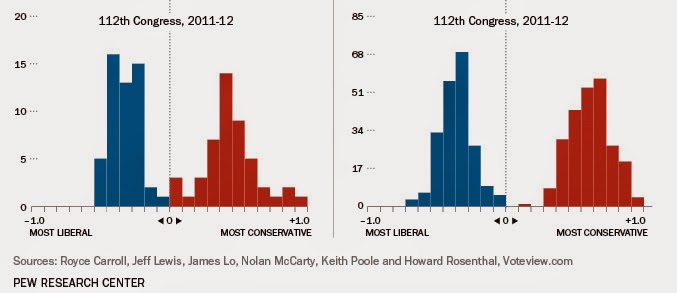Our form of government is
very likely irretrievably broken. The
most we may be able to expect from the federal government is constant crisis,
indecision, and the inability of Congress, the President, and the federal courts
to govern. That’s the conclusion of Matthew Yglesias in a recent article
in Vox. (See: http://www.vox.com/2015/3/2/8120063/american-democracy-doomed/) Yglesias writes:
“To understand the looming crisis in American politics, it's useful to
think about Germany, Japan, Italy, and Austria. These are countries that were
defeated by American military forces during the Second World War and given
constitutions written by local leaders operating in close collaboration with
occupation authorities . It's striking that even though the US Constitution is
treated as a sacred text in America's political culture, we did not push any of
these countries to adopt our basic framework of government.”
Just about every other country
has created a parliamentarian form of government rather that the presidential
form found in the U.S. Why? It’s very
simple writes Yglesias:
“In a parliamentary system, deadlocks get resolved. A prime minister
who lacks the backing of a parliamentary majority is replaced by a new one who
has it. If no such majority can be found, a new election is held and the new
parliament picks a leader. It can get a little messy for a period of weeks, but
there's simply no possibility of a years -long spell in which the legislative
and executive branches glare at each other unproductively.”
But within a presidential system, gridlock leads to a constitutional
trainwreck with no resolution.
And, the more
ideologically polarized our government becomes—assuming it is possible for it
to get more ideologically polarized—the more often we will see gridlock leading
to one constitutional trainwreck , as Yglesias puts it, after another.
Yglesia notes that in a
climate of sharp ideological differences, both sides begin playing "constitutional
hardball.”
Constitutional hardball describes legal and political moves "that
are without much question within the bounds of existing constitutional doctrine
and practice but that are nonetheless in some tension with existing
pre-constitutional understanding." In other words, moves that do not
violate the letter of the law, but do trample on our conventional understanding
of how it is supposed to work.”
Conservative Republicans
faced with a liberal, Democratic Senate and a Democratic President begin using
the filibuster to not just block the President and majority party on the big issues
but on just about every piece of legislation and every Presidential
appointment. Not getting their way, they
threaten to even shut down the government completely.
As Yglesias notes, the Republicans weren’t doing anything illegal or
unconstitutional, but what they were doing was “in its intent and its scope,
unprecedented.” The same could be said
for Obama’s counter moves.
As relations with Congress have worsened, the Obama administration has
set about expanding executive authority over domestic policy to match Bush-era
unilateralism in the national security domain. This came to the fore most
publicly with Obama's decision to protect millions of unauthorized migrants
from deportation without congressional agreement.
Again, in spite of what
you hear from Republicans and Fox News, there was nothing illegal or unconstitutional
about what Obama was doing, what he has said he felt he had to do to get
something done in Washington. However,
it is unprecedented.
Yglesia sees no hope that
things will get better. Congressional
districts are now, for the most part, gerrymandered by Republican state
legislatures to ensure that the House of Representatives will be filled with Republicans
with extremely Conservative views facing a minority Democratic caucus with less
extreme but decidedly liberal views. Today
the divide in the House is so great along ideological lines that, as someone
said, the most liberal House Republican is far more conservative than the most
conservative House Democrat. There is
almost no overlap between the two parties, at least in the House and this ideological
divide continues to increase in the Senate as it does among the American public
in general. Consider these charts
prepared by Pew Research.
Source: http://www.pewresearch.org/fact-tank/2014/06/12/polarized-politics-in-congress-began-in-the-1970s-and-has-been-getting-worse-ever-since/
Could A Dictatorship Be in Our Future?
In a separate article
at Vox, Dylan Matthews predicts that continuing and worsening gridlock in
Congress will lead to a tremendous expansion of presidential power regardless
of which party controls the White House or whether the President is a liberal
or conservative. Matthews notes:
“Any president worth his salt is going to want to make major revisions
to statutes and to alter the fiscal status quo. They're going to want to raise
taxes on the rich and increase transfer programs, or slash taxes across the
board while restructuring entitlement programs, or rewrite No Child Left Behind
and make Medicare more cost-effective, and so on. Their legacy as more than placeholders
depends on leaving some kind of legislative mark.”
Under a best case
scenario, writes Matthews, we could end up with an ” an elective dictator but
retain peaceful transitions of power.”
In the worst case, we end up with a President with greatly expanded
powers who decides to use (those powers) to punish political enemies, interfere
with elections, suppress dissent, and so forth.”
Matthews doesn’t think
that either scenario is very likely for a long time, perhaps ever. However, it could happen. That’s disturbing. Matthews thinks it is time for us to begin
thinking about a new and more workable and lasting parliamentarian form of
government. Why not? We did it before in 1788.



No comments:
Post a Comment